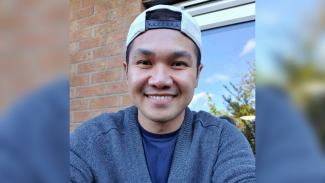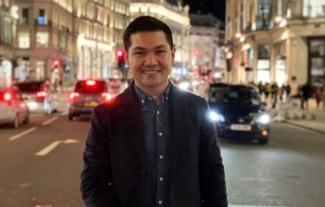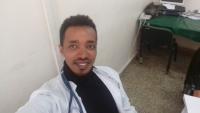How speaking to myself in the mirror every day helps

As a Clinical Research Nurse, John Bervin Galang's job involves a lot of talking. Here he shares the things that have helped him to feel more comfortable whilst promoting covid vaccine confidence in his patients.
Growing up, I was taught that a good son is a well-behaved student. Hence, during my early years at school, I would always stay silent in class. And that would mean not saying anything unless I was asking permission to go to the toilet or buying snacks during breaks. To be fair, I would always get the special award every year for being that 'well-behaved student'!
I remember when I was 10 and I was asked by my teacher to read a short passage in front of the class. I couldn't start a word, not even a syllable. I would stay standing like a statue. There were so many loud voices in my head at that time, so many random thoughts that my mouth couldn't cope. After a good few minutes I was able to speak. I shook from my knees to my throat until eventually I was able to make a sound — some funny sounds. I felt so frustrated because I knew how to read, but I just could not do it.
- Want to write your own article? See how you can Submit Something For The Site
At secondary school I had the opportunity to regain my confidence as I had new classmates and a new learning environment. I would talk to myself in front of a mirror. Every day, it was like I had to teach myself how to speak again. Before, I had problems saying words starting with S, T, L and K. I was fully aware of this; hence, I would choose my words and not use ones starting with those letters. I would find substituting words effective in finishing my sentences. It would sound long and annoying at times, but at least I ended them with my own words.
Present day
I am now 27 years old and working as a Clinical Research Nurse at a research facility in London. Enrolling in nursing school and speaking to lots of people has really helped me a lot.
I put myself out there and make conversations with different types of people. This has been most useful, especially because I speak with patients from all walks of life in my job.
I would say that I have embraced my stammer. I've set out to learn more about stammering and therapeutic interventions which have helped with my speech, and I've learnt a lot about myself. Interestingly, I don't stammer much with my learned second language, English, compared to when I am speaking using my mother tongue, Tagalog. I have also noticed that I stammer when I am too tired, especially when I lack sleep.
- See our At Work section for information on stammering in the workplace
I still speak to myself in the mirror every day, but this time with the goal of working on myself mentally, emotionally and physically, which I'll talk about next.

Mentally
I started to read books and watch movies with subtitles to improve my vocabulary. It also helps me gain general knowledge that I can use with my everyday normal conversations. I observe how actors pronounce their words and complete their sentences. I take note of all my thoughts and write them down whenever they pop into my head. This has really helped me organise my ideas and construct better sentences when I talk.
Emotionally
I train myself to be self-aware and more confident. I put myself out there and make normal conversations with different types of people. This has been most useful, especially because I speak with patients from all walks of life in my job. I prepare myself emotionally by taking deep breaths, mainly in stressful situations such as interviews or presentations (in person or by video call).
Physically
Another way I wanted to work on myself was by having dental braces done, something I’ve always been self-conscious about. This has increased my confidence in talking and especially smiling. I also do muscle exercises, particularly for my tongue, jaw, and cheeks. I find singing is remarkably effective too as it helps me learn to control my breathing and phrasing whenever I have to say long sentences. I also record my own voice to hear what it actually sounds like to other people.
All these practical tips have been useful for me as a nurse, where I am using my voice every day with my patients. I have also learned how to be comfortable with silence, which can be therapeutic in some conversations. It's all helped me, especially now, with the pandemic situation, so that I can provide health teaching and promote vaccine confidence as we help run some COVID-19 vaccine trials.
As people who stammer, we might need more time to talk sometimes, but it is always a good feeling to at least finish whatever we have started — especially our own sentences. With stammering, I have learned how to be an advocate for myself and other people too.
Read more stories from people who stammer — see Your Voice.

































